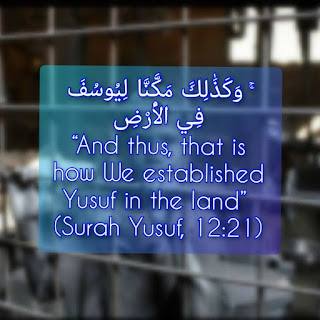When Yusuf was oppressively sold into slavery, purchased by a man from Egypt, Allah says:
ۚ وَكَذَٰلِكَ مَكَّنَّا لِيُوسُفَ فِي الْأَرْضِ
“And thus, that is how We established Yusuf in the land” (Surah Yusuf, 12:21)
Let's ponder upon Allah’s words here, in the context of Yusuf’s story: Wait a minute, what do you mean “established” Yusuf? Didn’t he just become commodity of human trafficking, got sold into child slavery, here, as a 7-year old? Didn’t the story just take another plunge to another tragedy - from the frying pan into the fire?
In fact, as we know later in the story, it’s in this very same household that the wife of his master would attempt to seduce him, and despite proven his innocence, would be unjustly imprisoned for many many years.
From solitary confinement at the bottom of a well in the middle of a desert, to slavery: isn’t much of an improvement, let alone an “establishment”, right?
How do we reconcile this?
Now, let’s fast forward the story. In the end, Yusuf himself was appointed as Al-‘Aziz, the one in charge of the resources of Egypt. Basically, he got the job of his Master.
How did he get there? This Egyptian man who bought Yusuf as a slave, was in fact al-‘Aziz. And it was the Qadar of Allah this man had the intention to raise Yusuf as if he was his own child, and told his wife to raise him in the best upbringing. And for the remainder of his childhood, it was in that household that Yusuf was raised and grew up in this environment of leadership, giving him the gradual exposure of managing and leading.
And yes, those other incidents happened - being seduced, thrown into prison - but it was through those very same incidents that became the necessary mechanisms for him to be established. It was in prison that he met his companion who got his dream by Yusuf, and it was this companion who was released from prison and got an occupation as a servant to the King. And years later, the King of Egypt experienced a strange dream in which no one among his knowledgeable royal advisors could interpret.
Hmm.. I wonder who’s pretty good at interpreting dreams?
King’s servant be like: “Hey, your Majesty, I think know a guy”
That’s how Yusuf got established.
How did all of this chain of events begin? By this very moment. This tragedy of being oppressively sold into slavery.
Sometimes the darkest moments in our lives – the worst of tragedies and calamities – though unpleasant and tragic, they could be what transforms us to become the people we need to be. The death of a loved one, the loss of our jobs, being rejected from others, getting stabbed in the back by people you trust. Yet, they could be the rude awakening that slaps us away from our heedlessness, into finally taking action to make a change.
That's why fictional hero stories use tragedies as a plot device all the time. Just ask Bruce Wayne or Peter Parker.
Don’t look at that tragedy as your downfall – rather, it could be the triggering moments of your hero’s journey – IF you take the right choices to allow it to be your triumphant moments.
We have a choice to view crisis as an opportunity. An opportunity to turn adversity to advantage. Tribulations into triumph. Obstacles into establishment.
وَلَنَبْلُوَنَّكُمْ حَتَّىٰ نَعْلَمَ ٱلْمُجَـٰهِدِينَ مِنكُمْ وَٱلصَّـٰبِرِينَ وَنَبْلُوَا۟ أَخْبَارَكُمْ ٣١
“We will certainly test you (believers) until We prove those of you who (truly) struggle and remain steadfast;
and We shall reveal your true colours.” (Surah Muhammad 47:31)

No comments:
Post a Comment